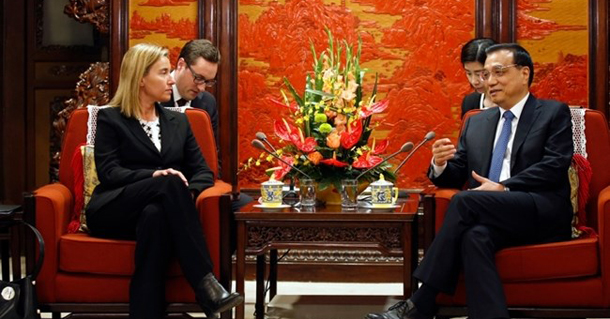
European Union foreign policy chief Federica Mogherini, left, listens to Chinese Premier Li Keqiang during their meeting at the Zhongnanhai Leadership Compound in Beijing, China Wednesday, May 6, 2015.
Photo: Kim Kyung-hoon/ AP
The EU High Representative for Foreign Affairs, Mrs Federica Mogherini, this month visited the People’s Republic of China (PRC) on her first official visit to Asia. During the talks she drew attention to the importance of the bilateral Human Rights Dialogue, this is in line with the European Parliament resolution of June 2012 which mandated that the EU High Representative for Foreign Affairs raise the issue of human rights during every meeting with China.
In a further sign of growing international concern regarding human rights violations in Tibet, the European parliament urged Mrs Mogherini to raise the issue of Tibetan rights during them visit, which took place from May 6 – 7.
In a letter written before the visit, 52 parliamentarians from six political groups wrote of their growing unease in regard to China’s treatment of Tibetans, citing particularly the arbitrary detention, arrest and torture of peaceful Tibetan protesters. They also called for a substantive and constructive dialogue with China, addressing core issues such as the preservation of the Tibetan language, culture, religion and tradition, and to re-open a dialogue with representatives of His Holiness the Dalai Lama. The avenue has remained closed since January 2010.
A total of 204 Tibetans are known to have been arrested or imprisoned since the new European Parliament was convened last year. Add to this a further six Tibetan deaths during or after imprisonment, and seven self- immolations, all of which add to the evidence of human rights abuses in the Tibetan Autonomous Region.
The EU Human Rights Dialogue with China was set up in 1995. Two rounds of the dialogue take place every year. Through it, the EU can address issues of concern such as the death penalty, re-education through labour, ethnic minorities’ rights, civil and political freedoms etc in a forum where China is committed to responding.
Evidence of growing pressure on China with regards to the Tibetan issue exists in similar petitions by other national governments. Countries which have urged representatives to raise these issues include the United States, France, and Australia. The effect such dialogue has on the PRC remains to be seen.




 Print
Print Email
Email